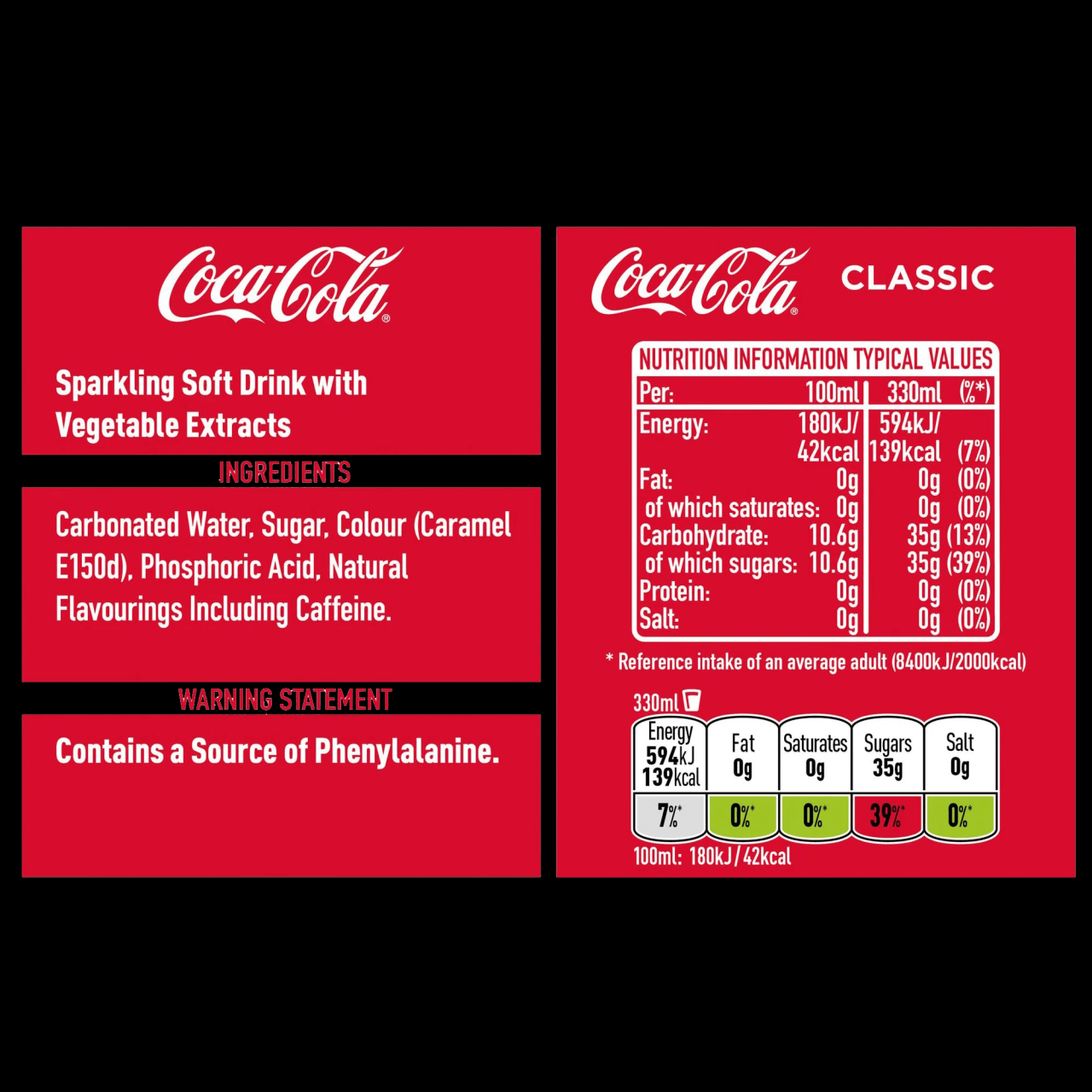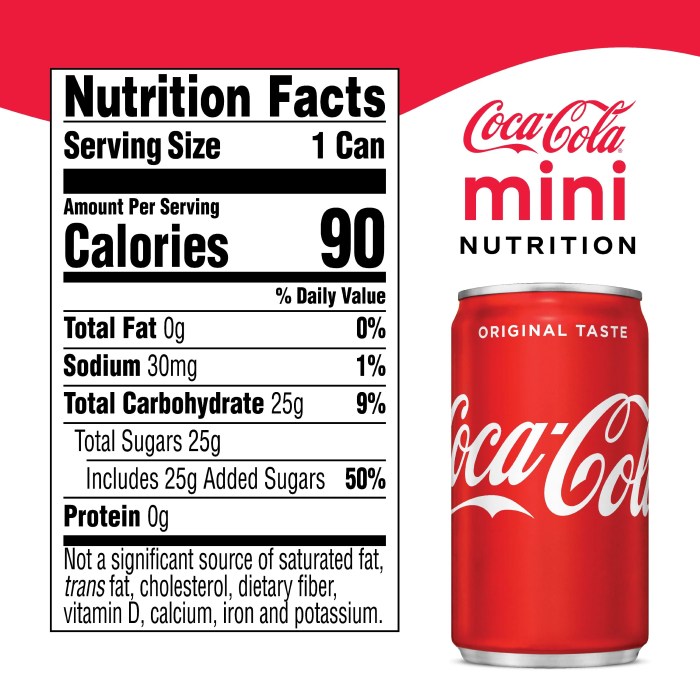Serving Size and Consumption

Canned coke nutrition facts – Alright, fam! Let’s get real about those sugary canned Coke vibes. We’re diving deep into the serving size and what guzzling down multiple cans daily can do to yourtubuh* (body). Think of it as your personal Bali health check-in, but for your Coke habit.
A standard can of Coke is typically around 355ml (12 fl oz). Picture this: a sleek, silver can, slightly taller than your average hand, brimming with that dark, bubbly goodness. Imagine the condensation on a hot Bali day –
-ah, refreshing!* But let’s not get lost in the deliciousness; we need to be mindful of what’s inside.
Nutritional Information Per Serving
A single 355ml can of Coke packs a punch, nutritionally speaking. It’s primarily sugar and water, with a good dose of carbonation. While the exact nutritional breakdown might vary slightly depending on the brand and region, a typical can contains roughly 140 calories, 39 grams of sugar (that’s about 10 teaspoons!), and negligible amounts of vitamins and minerals.
It’s basically liquid sugar, my friends.
Health Implications of Multiple Servings, Canned coke nutrition facts
Now, let’s talk about the potential downsides of regularly consuming multiple cans of Coke daily. It’s not all sunshine and rainbows, unfortunately. Overconsumption can contribute to some serious health issues.
Canned Coke’s nutritional profile is notoriously high in sugar and empty calories, offering little nutritional value. A stark contrast emerges when comparing this to the nutritional content of baked goods; for example, checking the detailed breakdown of blueberry muffin nutrition facts reveals a different, albeit still often calorie-dense, nutritional landscape. Ultimately, both highlight the importance of mindful consumption and balanced diets, as the sugar content in canned Coke far surpasses that found even in a relatively high-calorie treat like a blueberry muffin.
- Weight Gain: Those calories add up quickly! Excessive sugar intake contributes to weight gain and obesity, increasing the risk of various health problems.
- Type 2 Diabetes: The high sugar content can significantly increase your risk of developing type 2 diabetes, a chronic condition affecting blood sugar regulation.
- Tooth Decay: The high sugar content is a breeding ground for cavity-causing bacteria. Regular consumption can lead to tooth decay and other dental problems.
- Heart Disease: Studies have linked high sugar intake to an increased risk of heart disease and other cardiovascular issues. It can contribute to high blood pressure and unhealthy cholesterol levels.
- Other Health Problems: Excessive sugar consumption has been linked to a range of other health issues, including non-alcoholic fatty liver disease, certain types of cancer, and even mental health concerns.
Caloric Intake from Multiple Servings
To illustrate the impact of multiple servings, let’s look at a simple table:
| Number of Cans | Total Calories |
|---|---|
| 1 | 140 |
| 2 | 280 |
| 3 | 420 |
As you can see, consuming even a few extra cans daily significantly increases your overall caloric intake, potentially leading to weight gain and other health problems. Remember, moderation is key, my friends!
Alternatives to Canned Coke: Canned Coke Nutrition Facts

Hey, fellow Bali vibes seekers! So, you’re craving that fizzy refreshment, but maybe your inner yogi is whispering about healthier choices. Let’s explore some delicious and refreshing alternatives to canned Coke, keeping it real and easy breezy.
Healthier Beverage Alternatives
Choosing healthier drinks isn’t about deprivation; it’s about mindful refreshment! The table below shows some fantastic options, showcasing their nutritional profiles. Remember, portion sizes matter, even with healthier choices.
| Beverage | Calories (per 8oz serving) | Sugar (per 8oz serving) | Other Key Nutrients |
|---|---|---|---|
| Water | 0 | 0 | Essential for hydration, no added sugars or calories. |
| Unsweetened Iced Tea | 0-5 | 0-1g | Antioxidants, refreshing, can be customized with lemon or other natural flavors. |
| Coconut Water | 40-50 | 5-7g | Electrolytes, naturally sweet, hydrating. |
| Infused Water (Cucumber, Mint, Lemon) | 0 | 0 | Refreshing, customizable flavors, hydrating. |
| Sparkling Water with a Squeeze of Lime | 0 | 0 | Fizzy satisfaction without the sugar crash. |
Benefits of Healthier Alternatives
Switching up your drink game can bring some serious benefits:
- Weight Management: Cutting back on sugary drinks significantly reduces your calorie intake, aiding in weight management.
- Improved Energy Levels: Avoiding the sugar rush and crash leads to more stable energy throughout the day.
- Better Oral Health: Less sugar means less risk of tooth decay and gum disease.
- Hydration Boost: Water and other healthy beverages keep you properly hydrated, improving overall health.
- Reduced Risk of Chronic Diseases: Studies show that reducing sugar intake can lower the risk of type 2 diabetes, heart disease, and other chronic conditions.
Cost and Accessibility Comparison
Let’s get real about the price tag. Canned Coke is readily available and often relatively inexpensive, especially in larger quantities. However, healthier alternatives like water are even more affordable and accessible. Unsweetened iced tea, coconut water, and sparkling water can be slightly more expensive depending on the brand and location, but the long-term health benefits far outweigh the potential price difference.
Making infused water at home is the ultimate budget-friendly option. Think of it as an investment in your well-being – totally worth it!
Questions and Answers
Does the can size affect the nutritional information?
Yes, nutritional information is usually given per serving size. A larger can will contain more calories, sugar, etc. Always check the label for the specific serving size and the nutritional facts for that size.
Is there caffeine in canned Coke?
Yes, Coca-Cola contains caffeine. The exact amount can vary slightly, but it’s generally around 34mg per 12-ounce can.
What are the long-term effects of drinking canned Coke regularly?
Regular consumption of sugary drinks like Coke is linked to increased risk of weight gain, type 2 diabetes, heart disease, and tooth decay. Moderation is crucial.
Are there any natural alternatives to the artificial sweeteners in Diet Coke?
Yes, Stevia and monk fruit are popular natural sweeteners. However, it’s important to note that even natural sweeteners should be consumed in moderation.
